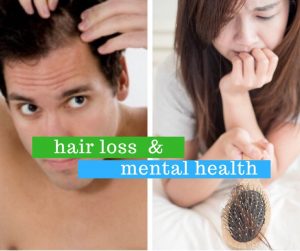The problems of hair loss are very common, especially in the male population. Almost every society in the world associates luxurious hair with youth, beauty, and good health.  For many people, hair is what makes them feel beautiful. Hair loss can be devastating and psychologically traumatic to some individuals while some might take it normally. Certain aspects of lifestyle like diet, environment, alcohol intake, use of medications and sleep pattern can play an important role in hair loss.
For many people, hair is what makes them feel beautiful. Hair loss can be devastating and psychologically traumatic to some individuals while some might take it normally. Certain aspects of lifestyle like diet, environment, alcohol intake, use of medications and sleep pattern can play an important role in hair loss.
Mental disorders and abnormal psychological states have a bidirectional relationship with hair loss. On one hand, psychiatric illnesses can lead to hair loss and on the other hair loss can be an important precipitating factor for psychiatric illnesses.
- Depression and hair loss: The physiological states of depression such as low mood, discouragement, low self-esteem, decreased self-care and anhedonia can be a factor in reducing the hair growth phase, leading to hair loss. There are some medications of depression that might also lead to hair loss.
- Anxiety and hair loss: The severe form of anxiety can predispose an individual to hair loss. Anxiety is usually long term and causes persistent stress, which can affect the growth phase of hair. This is triggered via the stress pathway and release of stress hormones in the brain.
- Trichotillomania: This anxiety spectrum disorder is a habitual condition that is caused when a person is anxious and begins to pull out his/her own hair without even realizing it. Some patients suffering from this condition often pullout large quantities of hair from the scalp.
- Chronic stress and hair loss: Stress is one of the major factors determining hair growth. Emotional stress can significantly slow, or even stunt the normal growth cycle of hair. Once the hair has stopped its growth cycle, it lies dormant and eventually sheds after a few months.
- Others: The psychiatric illnesses like psychosis, anorexia nervosa, schizophrenia, etc. might predispose a person for hair loss. Hair loss in these conditions could be due to stress or lack of nutrition.
On the other hand, psychiatric disorders are more common in people with hair loss than in the general population. The finding from research suggests that people with hair loss might be at higher risk of developing a serious depressive episode, anxiety disorder, social phobia, or paranoid disorder.
For some individuals, coping with sudden hair loss may be equated with grieving after bereavement due to the ongoing feeling of loss. Individuals might experience lower self-esteem, poor quality of life, and poor body image. Loss of eyebrows and eyelashes might also be linked with problems with identity as these features help to define a person’s face. A study conducted by the Journal of the American Academy of Dermatology showed that emotional and mental sufferings are more in women than in men.
The women are more likely to develop a negative body image as compared to men dealing with the same issue. Younger individuals (less than 40 years) experience worse anxiety and depression compared to older individuals. Early-onset of hair loss negatively affects self-image and self-esteem. Low self-esteem makes it more difficult when looking for life partners and employees. Moreover, peer pressure exaggerates the need for social acceptance that might subsequently cause younger individuals to be more vulnerable to depression and anxiety.
The dermatologists/trichologists should be aware of the psychological causation and impact of hair loss (alopecia). With the rapidly growing newer technologies of hair transplantation (a potentially irreversible process) psychological evaluation is a must for all the individuals with hair loss. This should be done to rule out any psychological cause of hair loss and as a pre-surgical evaluation to prevent any advert psychological sequelae of hair loss or hair transplantation. This will help the individual to better understand alopecia and the psychological responses related to hair loss.



